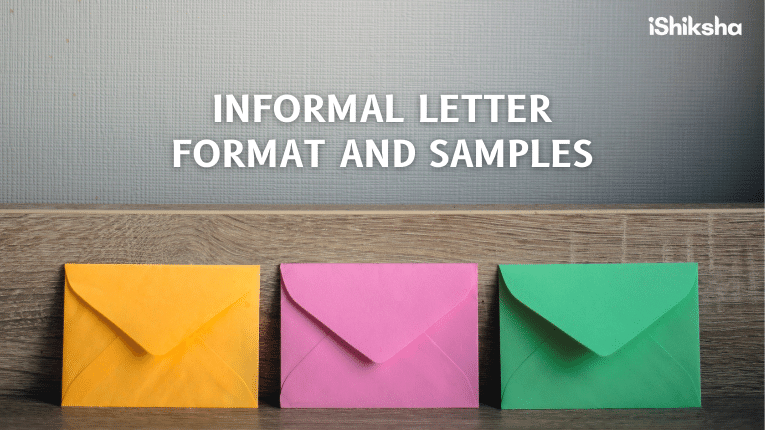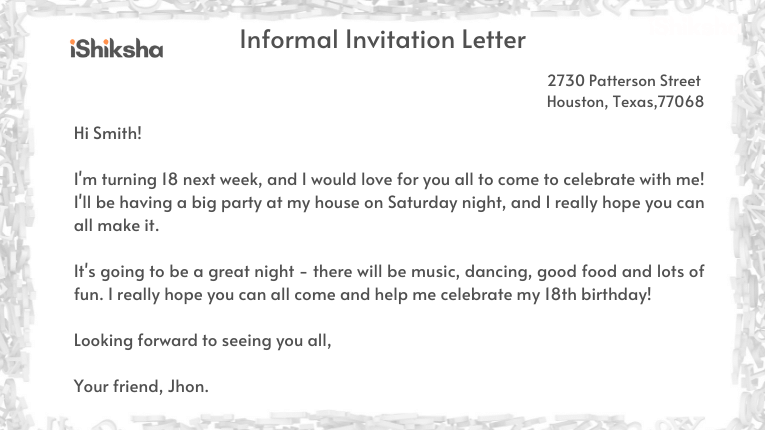An informal letter is a friendly letter written to friends, family, relatives, or acquaintances about personal matters in an informal and conversational tone. Unlike formal letters used for professional purposes, informal letters allow us to communicate casually and intimately with our close ones.
In this article, we will learn all about informal letters – their purpose, format, and tips for writing them well. Understanding the proper informal letter format in English is important to communicate effectively with our loved ones.
What is an Informal Letter?
An informal letter is a letter written to friends, family, relatives, or acquaintances about personal matters rather than professional affairs. The language and tone used in an informal letter are casual, familiar, personal, informal, conversational, and intimate.
Informal letters do not follow any specific rigid format. The writing style is spontaneous, natural, and friendly. You can share news, give updates about your life, express your feelings, ask questions, and stay connected with your loved ones through informal letters.
Key Features of Informal Letters:
- Written to friends, family members, relatives, or acquaintances
- Focus on personal matters and issues
- Use an intimate, informal, casual tone
- Conversational style and language
- No set professional format
- Share news, give life updates, express sentiments
- Strengthen personal relationships
Informal letters create a bridge for personal communication between close relationships. They convey a warm, sincere, authentic feeling through the informal, friendly tone.
 How to Write an Informal Letter? – Informal Letter Format
How to Write an Informal Letter? – Informal Letter Format
Though informal letters do not follow any specific format, there are some basic guidelines you can follow to write an effective informal letter:
1. Addressee Details
- Begin with recipient’s address at the top left corner of the letter. For example: Ankit Arora B-35, Rail Nagar Delhi – 110034
-
Add date below the address. For example: January 18, 2023
Use an appropriate salutation like “Dear Ankit” or “Hi Mihir”. Avoid using very formal salutations like “Respected Sir/Madam”.
2. Opening
- Start with an opening line like “How have you been?” or “Hope you are doing well”.
- Mention the purpose of the letter in the first paragraph itself if required. For example, you can state, “I am writing to let you know about…”
3. Body
- Include 1-3 paragraphs in the body of the letter.
- Share personal news, thoughts, experiences in a conversational tone and style.
- You can ask questions, give suggestions, make plans, etc. to engage the recipient.
- Use informal language, slang, abbreviations instead of formal vocabulary.
4. Closing
- End the letter with affectionate remarks like “Love”, “Take care”, etc.
- Sign off with your name like “Yours lovingly,” or “Yours truly”.
- Avoid very formal closings like “Sincerely” or “Regards”.
Informal Letter Format (An Overview)
| Parts | Guidelines | Example |
|---|---|---|
| Sender’s Address | Your full address in the top left corner | A-101, City Apartments, Perai, Chennai – 600096 |
| Date | Date below the sender’s address | 6th March 2023 |
| Salutation | Dear [Name/Nickname], Hi [Name], etc. | Dear Sneha, Hi Ronit, |
| Opening | Friendly opening line, ask about recipient, state purpose | Hope your new college is going great! I wanted to share some news… |
| Body | 1-3 paragraphs, share news, thoughts, experiences, ask questions | My family visited Jaipur last week…The food was amazing! What have you been up to? Let me know how your exams went. |
| Closing | End with good wishes, affectionate remarks | Take care. Love, Missing you! Yours truly, |
| Signature | Sign off with your name | Simran, Rahul |
Types of Informal Letters
Common examples of informal letters include:
- Invitations to events like parties, weddings, reunions
- Apologies for missing an event, forgetting something etc.
- Thank you notes showing gratitude
- Congratulations on major milestones
- Checking in on someone’s wellbeing and asking how they are
- Sharing exciting personal news and life updates
- Making requests for help/favors
- Expressing thoughts, feelings and affections
- Trip/holiday invitations
- Wedding invitations
Informal Letter Writing Tips
Follow these tips to write effective personal and engaging informal letters:
- Use a conversational tone – Write like you are talking to a close friend.
- Be personal – Freely share your thoughts, experiences, and stories.
- Ask questions – Engage the recipient, and show interest in their life.
- Use humor and wit – Sprinkle some harmless jokes or funny anecdotes.
- Incorporate popular culture references like books, TV shows, songs, celebrities etc. that the recipient can relate to.
- Use informal language – Don’t be afraid of using slang, abbreviations, or emoticons. Avoid stiff, formal vocabulary.
- Add specific details – Share where you went, what you ate, and who you met rather than writing in broad general terms.
- Make future plans – Suggest meeting up, and going somewhere together.
- Apologize if required – If you have not written in a while, apologize affectionately.
- Convey your feelings – Express how much you miss them or value their friendship.
- End warmly – Close with nice wishes, loving remarks, and terms of endearment. Sign off with your first name.
Difference Between Formal and Informal Letter Format
Here is an overview of the key differences between formal and informal letter formats:
| Basis | Formal Letter | Informal Letter |
|---|---|---|
| Purpose | Used for official, business, or commercial matters. | Used for personal and social conversations. |
| Format | Follows a structured and rigid format. | Adheres to a flexible and casual format. |
| Language | Utilizes formal and professional language. | Relies on everyday, conversational language. |
| Tone | Maintains a serious, formal, and impartial tone. | Conveys a personal, casual, and warm tone. |
| Sentence Structure | Consists of proper, grammatically correct sentences. | Contains casual sentences, where fragments are okay. |
| Length | Tends to be longer in length. | Typically shorter in length. |
| Content Type | Contains factual and objective information. | Includes personal experiences, thoughts, and feelings. |
| Salutation | Begins with “Dear Sir/Madam” or “Respected…” | Starts with “Dear [Name],” “Hi/Hello [Name],” or “Hey!” |
| Closing | Ends with “Yours faithfully” or “Sincerely” | Concludes with “Love,” “Take care,” “Hugs,” or “Your friend” |
| Signature | Includes the full name and designation (if any). | Usually signed with the first name or a nickname. |
Informal Letter Format to Friend
Here is two example of how an informal letter to a friend:
Example 1:
Sender’s Address
Naina Gupta A-35, Kamla Nagar Agra – 282005
Date July 19, 2023
Salutation
Dear Sonam,
Opening Hi! How have you been? I hope you are enjoying your vacation in Goa. You are so lucky to be spending summer at the beach! Things have been busy here as usual.
Body
Guess what? Remember I had auditioned for the school play last month? I got selected to play the lead role of Jo in Little Women! I’m so excited but also a little nervous. The show is in September. We’ve already started our rehearsals which are every Saturday. I can’t wait for you to watch me on stage!
The rehearsals have been great fun. I’ve made some new friends who are also part of the cast. We hang out after rehearsals sometimes to run lines and practice scenes. I’ll introduce you to them once you’re back. There’s also this cute guy Vikram from the batch above us who is playing Professor Bhaer. I’ve talked to him a few times and he seems really nice.
Anyway, are you having an awesome time at the beach? Send me some pictures! How is the food? Have you tried surfing? I’m sure learning to surf must be so cool. We definitely need to plan a trip to Goa together someday. For now, I’ll just hear your stories once you get back! Take care and keep having fun!
Closing
Love, Naina
Example 2:
204 Hill View Apts,
Mumbai,
16th March, 2023
Dear Nisha,
Hi friend! Hope this letter finds you happy and healthy. It’s been so long since we connected, isn’t it? How have you been doing? I miss our school days when we would chat for hours and share every little detail with each other.
Life’s good on my end! I just started studying at a new college last week. Made a few friends but I must tell you – nobody is as fun as you are! College is quite challenging and so many new subjects to learn.
Our college is organizing a field trip next month. We are going to stay overnight at a farmhouse and do lots of outdoor activities for 2 days! It will be super fun I’m sure. I can’t wait to tell you all about it once I’m back. There’s so much more I want to share with you. Let me know when you are free to meet up! We’ll have a blast together.
Looking forward to your reply. Write back soon!
Love,
Nancy
Example 3:

Informal Letter Format in Hindi
प्रिय मित्र,
आपका हाल चाल कैसा है? मुझे आशा है कि आप स्वस्थ और खुश होंगे। बहुत दिनों बाद मैं आपसे बात कर रहा हूँ। मैं आपको बहुत याद करता हूँ। हमारे स्कूल के दिन कितने अच्छे थे जब हम घंटो बात करते थे।
मेरी तरफ से सब ठीक है। मैंने कल ही नए कॉलेज में दाखिला लिया है। मुझे कुछ नए दोस्त भी मिल गए हैं लेकिन आप जैसा मज़ा कोई नहीं देता। कॉलेज में बहुत सारे नए विषय हैं और पढ़ाई भी कठिन है।
हमारे कॉलेज में अगले महीने एक फील्ड ट्रिप का आयोजन है। हम दो दिन के लिए एक फार्महाउस पर रुकेंगे और बाहर की गतिविधियों का आनंद लेंगे। यह बहुत मज़ेदार होगा। ट्रिप से लौटने के बाद मैं आपको सारी ख़बरें दूंगा। मुझे आपसे मिलने का बेसब्री से इंतज़ार है। जल्द ही मुलाक़ात करने का वक्त निकालिएगा। हम धमाल मचाएंगे!
जल्द जवाब दीजिएगा। आपका पत्र बेसब्री से इंतज़ार रहेगा।
प्रेम से, राहुल
Informal Letter Topics
Here are some common topics and occasions you can write informal letters about:
- Sharing personal experiences like travel, hobbies, fun activities
- Describing family events like vacations, reunions, weddings
- Updating your news – exams, results, achievements
- Sharing problems and asking for advice
- Expressing love, gratitude
- Apologizing for not being in touch
- Inviting someone to visit you
- Making future plans to meet up
- Catching up with an old friend after a long time
- Consoling someone in difficult times
- Congratulating achievements like new job, pregnancy
- Wishing on occasions like birthdays, festivals
- Discussing light-hearted funny experiences
- Recommending books, shows, music
- Reminiscing childhood memories
Conclusion
Informal letters allow us to intimately connect with our loved ones by sharing our lives in a casual, conversational way. Following the informal letter format with a warm, friendly tone and personal content helps strengthen relationships.
The flexibility of informal letter writing lets us express our thoughts, feelings, stories, and experiences to friends and family in an authentic manner. Learning how to write informal letters well is a valuable communication skill we can use to spread love and stay bonded with our close circles.
